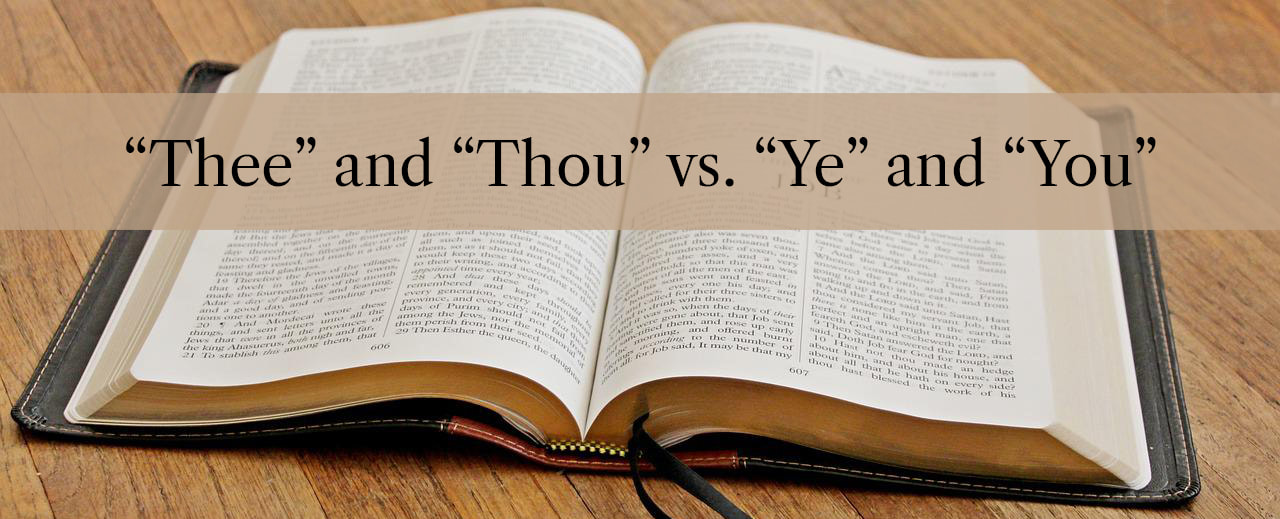|
The "thee's" and "thou's" of the KJV are not merely antiquated language. These terms had actually fallen out of use by the time that the KJV was translated, but the translators recognized the need to resurrect this antiquated terminology in order to keep their translation as accurate as possible. You see, both the Hebrew language and the Greek language have a distinction between the singular second person pronoun and the plural second person pronoun. This distinction is so much a part of these two languages that many passages of Scripture did not contain any other means of distinguishing whether a statement was being addressed to an individual or to a group. The only way to know whether the second person pronoun was used in reference to a single individual or to multiple individuals was to recognize which form was used: ie. whether the pronoun was plural or singular.
By the time that the KJV was translated, English no longer had a distinction between the singular second person pronoun and the plural second person pronoun. The term "you" was used for both singular and plural. This created a problem for the translators who needed a way to translate the distinction between singular and plural that existed in the original languages of Scripture. They found a solution to this problem in the resurrection of the antiquated singular second person pronouns in the English language - ie. "thee" and "thou." Thus, anytime that you find the term "thee" or the term "thou" in the KJV, you can know that the person using that term was referring to a single individual, and anytime that you see the terms "ye" or "you" in the KJV, you can know that the person using that term was referring to a group of individuals. This can be a great aid in understanding the Bible as we can see in passages like Matthew 26:64. Notice the difference between the KJV wording of this verse and the ESV wording: "Jesus saith unto him, Thou hast said: nevertheless I say unto you, Hereafter shall ye see the Son of man sitting on the right hand of power, and coming in the clouds of heaven." "Jesus said to him, 'You have said so. But I tell you, from now on you will see the Son of Man seated at the right hand of Power and coming on the clouds of heaven.'" In the KJV rendering, the distinction between the singular second person pronoun (thou) and the plural second person pronoun (you) reveals that Jesus addressed the first part of His response to the high priest as an individual, but then He turned and addressed the whole congregation in order to tell them that he would fulfill the prophecy of Daniel 7:13. This subtle change is completely lost in the ESV which makes it seem as if Jesus was addressing the high priest in both parts of His answer. The KJV's use of this antiquated terminology is thus very helpful in understanding the meaning inherent in the original languages of Scripture. By the way, it's also helpful to realize that the pronouns ending in "e" are always in the nominative case while those ending in "ou" are in the objective case. This means that "thee" and "ye" will always be either the subject or the predicate nominative of a sentence. These words are used for the individual doing the action of the sentence. "Thou" and "you" will always be the direct object or the object of a preposition. They are used for individuals who are the recipients of the action. It is common in our day for scholars to sneer at the use of the KJV, but I have yet to find any other translation that shows this level of care in preserving the meaning of the original text of Scripture.
2 Comments
Michael J Montagna
12/24/2022 03:27:16 am
Dear Mr. Fortenberry
Reply
11/8/2023 09:24:06 am
Hi Bill,
Reply
Your comment will be posted after it is approved.
Leave a Reply. |
Bill Fortenberry is a Christian philosopher and historian in Birmingham, AL. Bill's work has been cited in several legal journals, and he has appeared as a guest on shows including The Dr. Gina Show, The Michael Hart Show, and Real Science Radio.
Contact Us if you would like to schedule Bill to speak to your church, group, or club. "Give instruction to a wise man, and he will be yet wiser: teach a just man, and he will increase in learning." (Proverbs 9:9)
Search
Topics
All
Archives
June 2024
|



 RSS Feed
RSS Feed